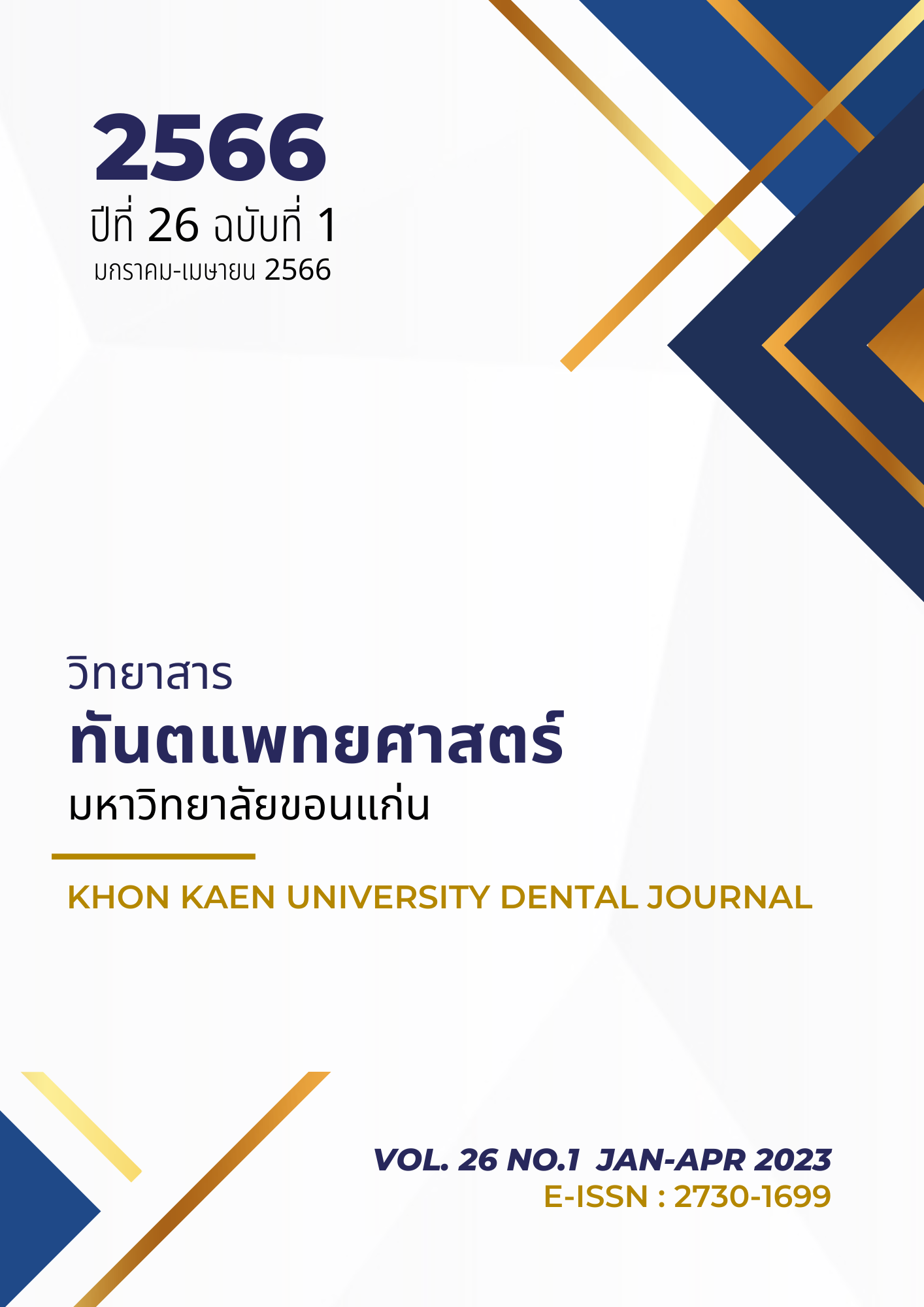Effect of Oral Health Promoting Chatbot Program on Knowledge in Oral Health Care of the Elderly
Main Article Content
Abstract
The purpose of this study was to develop and evaluate a chatbot program for oral health promotion aimed at increasing the oral health knowledge of elderly people. Using a quasi-experimental design, 57 elderly students from Ban Suan Sinor schools in Muang district of Chonburi Province were studied. The study was conducted during December 2021 to March 2022. The "Chatbot Vaikao Sukkai Sabaipak" oral health education chatbot program for the elderly was developed using the ChatFuel platform through Facebook Messenger. In order to assess oral health care knowledge, baseline and 14-day follow-up interviews were conducted, as well as a satisfaction survey. The percentage, mean, standard deviation, and paired sample t-test were used to analyze the data. The findings revealed that the majority of participants were female (81%) and had an average age of 67. The participants completed the 14 day-program for 63.2 percent. The average number of engagement days was 11. There was a statistically significant difference in their oral health knowledge scores before and after the program on all aspects of oral health care (before 7.53±1.81, after 9.72±1.60) (P<0.001). The most appealing feature of the chatbot's content was its practical usefulness. The elderly reported having difficulty with reading small text messages, touching selection buttons, and chatbot notification system discontinuities. According to the results of the study, the chatbot program improved the oral health care knowledge of the elderly. Therefore, it is necessary to create a chatbot for use in providing oral health care to community-dwelling elderly.
Article Details

This work is licensed under a Creative Commons Attribution-NonCommercial-NoDerivatives 4.0 International License.
All articles, data, content, images, and other materials published in the Khon Kaen University Dental Journal are the exclusive copyright of the Faculty of Dentistry, Khon Kaen University. Any individual or organization wishing to reproduce, distribute, or use all or any part of the published materials for any purpose must obtain prior written permission from the Faculty of Dentistry, Khon Kaen University.
References
Wongworasun S, Hunsrisakhun J, Watanapa A. Effectiveness of oral exercise program on oral function among independent elderly people: a cluster randomized controlled trial [dissertation]. Songkhla: Prince of Songkla University;2021.
Bureau of Dental Health. The 8th Thailand national oral health survey report. Bangkok: Sam Chareon Panich;2017.39-41.
Suraseranivong R. Oral cavity in elderly. JCP 2018;14(1):87-100.
Minakuchi S, Tsuga K, Ikebe K, Ueda T, Tamura F, Nagao K, et al. Oral hypofunction in the older population: Position paper of the Japanese Society of Gerodontology in 2016. Gerodontology 2018:35(4)317-24
Positioning Magazine [Internet]. Insight into the way of the media age “LINE-TV-FACEBOOK” Occupying the old age [updated 2018 Sep 5]. Bangkok Religion Information. Available from: https://positioningmag.com/1186242. (In Thai)
Wu T, Deng Z, Feng Z, Gaskin DJ, Zhang D, Wang R. The effect of doctor-consumer interaction on social media on consumers' health behaviors:Cross-sectional study. J Med Internet Res 2018;20(2):1-14.
Bibault JE, Chaix B, Guillemassé A, Cousin S, Escande A, Perrin M, et al. A Chatbot versus physicians to provide information for patients with breast cancer: blind, randomized controlled noninferiority trial. J Med Internet Res 2019; 21(11):1-7.
Chaix B, Bibault JE, Pienkowski A, Delamon G, Guillemassé A, Nectoux P, et al. When chatbots meet patients: one-year prospective study of conversations between patients with breast cancer and a chatbot. JMIR Cancer 2019;5(1):1-7.
Jang S, Kim JJ, Kim SJ, Hong J, Kim S, Kim E. Mobile app-based chatbot to deliver cognitive behavioral therapy and psychoeducation for adults with attention deficit: a development and feasibility/ usability study. Int J Med Inform 2021; 150: 104440.
Hunsrisakhun J, Pithpornchaiyakul S, Heemsuree N, Phiancharoen W, Sornsung C, Subkamondit R, et al. Effectiveness of promoting on tooth brushing behavior for children 6 mouths-2 years old by caregivers under application of Protection-motivation theory and social media based on adaptation learning 21 for FUN. Report. Songkhla: Department of Preventive Dentistry, Faculty of Dentistry, Prince of Songkla University; 2020.
Best JW. Research in education. 3rd ed. New Jersey: Prentice Hall; 1997.
Pengsawat W. Research and development. SNRU J 2009;1(2):1-12.
Zhang J, Oh YJ, Lange P, Yu Z, Fukuoka Y. Artificial intelligence chatbot behavior change model for designing artificial intelligence chatbots to promote physical activity and a healthy diet: viewpoint. J Med Internet Res 2020;22(9):1-13.
Fitzpatrick KK, Darcy A, Vierhile M. Delivering cognitive behavior therapy to young adults with symptoms of depression and anxiety using a fully automated conversational agent (woebot): a randomized controlled trial. JMIR Ment Health 2017;4(2):1-11.
Fufaung T, Chaleonnan A, Chokchuepattanakit W, Thongngam P, Schmitt R. Development of digital literacy learning chatbot for undergraduate students. In:Prakancharoen S, Samutrak P, Sutthaluang N, Mookdarsanit P, editors. Proceedings of the 4th National Conference in Science and Technology; 2021 May 22; Faculty of Science, Chandrakasem Rajabhat University. Bangkok, Thailand; 2021. 29-38.
Sap-in R, Khaoroptham Y. The elderly and Media in Thailand. DPU Comm Arts Journal 2017;11(2):367-87.
Wiratunga N, Cooper K, Wijekoon A, Palihawadana C, Mendham V, Reiter E, et al. FitChat: conversational artificial intelligence interventions for encouraging physical activity in older adults. arXiv:2004.14067v1. 2020 Apr [cited 2022 Mar 10]. Available from:https:// arxiv.org/pdf/2004.14067.pdf
Maltz M. 21-Day Habit Theory. Psycho cybernetics and self-fulfillment. Deluxe edition. Englewood Cliffs, New Jersey: Prentice-Hall, Inc.; 2016.
Lally P, Van Jaarsveld CHM, Potts HWW, Wardle J. How are habits formed: Modelling habit formation in the real world. Eur J Soc Psychol 2010;40(6): 998-1009.


